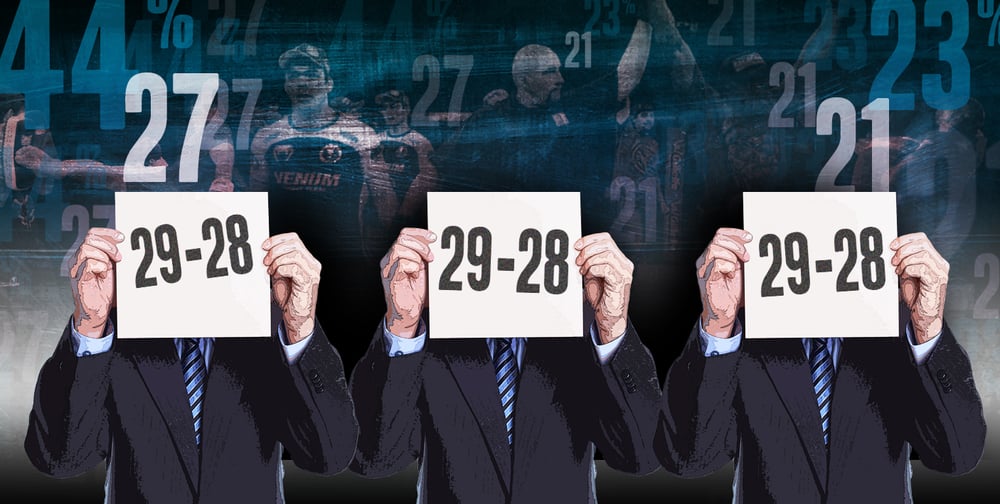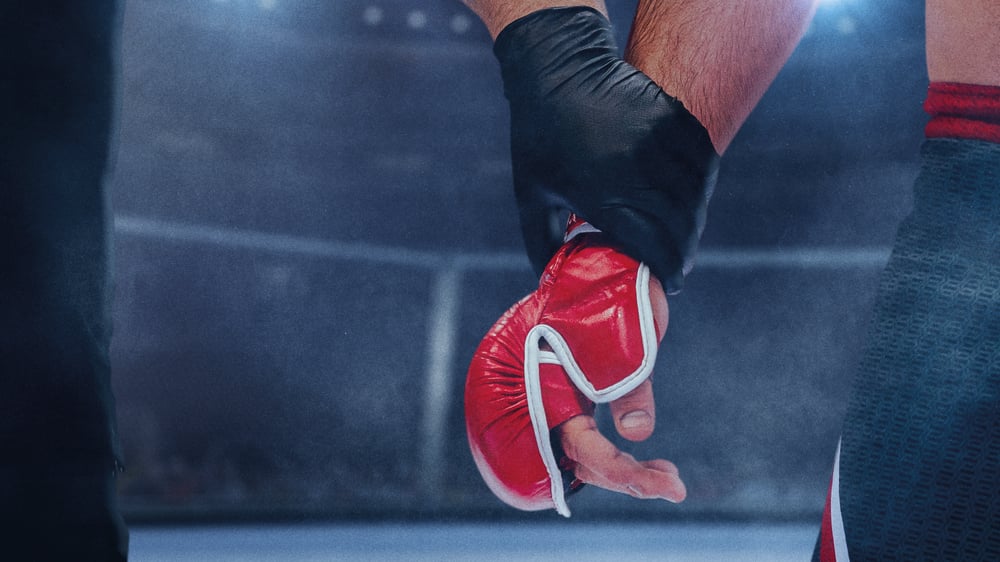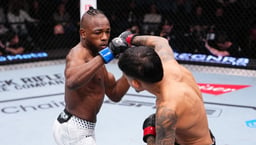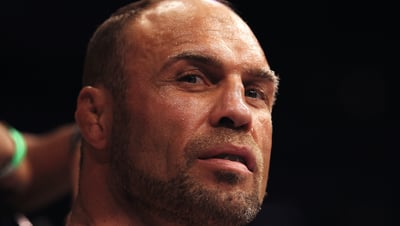
issue 218
June 2025
Ray Klerck dives into new research that might expose the real reason your favorite comebacks almost never happened
Imagine getting smoked in the face for 5 straight minutes and then being asked to guess how you’re doing. That’s the current reality of MMA judging. Fighters go into the third round hoping their corner is psychic, and the judges have their mental abacus dialed in. Now imagine something radical: What if those fighters were told or shown the score? What if, during that 60-second stool session between rounds, a coach could say, “You’re down two rounds,” and actually know it’s true? This idea isn’t just fantasy matchmaking for bored fight fans. It’s a real question posed by a brand-new May 2025 study published in the Journal of Sports Analytics. Using thousands of UFC fights and truckloads of striking, grappling, and control metrics, the study asks a simple yet seismic question: does knowing the score change how fighters perform in the final round? The short answer? Yes. The longer answer? Oh boy, it gets ultra weird and way more revealing than any post-fight presser meltdown.
THE LAZY FIGHTER MYTH JUST GOT CHOKED OUT
One of the loudest arguments against open scoring is the specter of the coasting fighter. He’s the guy who knows he’s ahead and decides to turn into a human sandbag. The concern is that, once ahead, a fighter will simply cruise through the third round, circle like a meerkat sizing up a cobra that it knows strikes first, and jab just enough to stay alive. That’s not what the promoters, fans, or fighters want, and the numbers from this new study paint a different picture. In fights where one athlete was clearly ahead, meaning all three judges had them up 20–18, and the performance data gave them a 90%+ probability of winning both rounds, those fighters didn’t slow down. They actually won the third round more often. They unquestionably wanted the finish and fight bonus. Eighty percent of them stayed in control and either sealed the win via the judges or put a full stop on the proceedings with a finish. That’s far from coasting. It’s closing. And it throws sand on the fiery argument that open scoring creates lazy frontrunners. If anything, it shows that the truly elite keep their foot on the neck and accelerator when they know they’re winning. Consider it one of the few benefits of meme culture where a highlight KO can raise someone’s stock.
WHEN YOU KNOW YOU’RE LOSING YOU ADAPT
Here’s where the twist kicks in. You may think fighters told they’re losing would turn into sniffing salt-fueled berserkers, tossing caution and cardio into the wind in search of a Hail Mary. However, according to this study, the reality is more nuanced and disappointing for the fans. Fighters who knew they were definitively behind on the cards weren’t more aggressive. They were less tactical. The data showed they threw fewer takedowns, attempted fewer submissions, and seemed to subtly shift toward stand-up exchanges, possibly hoping for a one-punch comeback. But this wasn’t more volume. It was more desperation. Instead of mixing levels, creating scrambles, or diving for the mat where submission threats live, they abandoned the grind for the glory shot. It's the MMA equivalent of needing a job and only applying to be CEO. Knowing they were losing didn’t make them better. It made them gamble. And gamblers rarely cash in, especially in the final five minutes of a fight that's already slipping away.

THE SCIENCE BEHIND THE CHOKE
There’s an emotional toll to open scoring that can’t be graphed, but the science gives us clues. A fighter who knows they’re down on the cards may not go for broke in a Holloway-Gaethje throwdown. Research across other sports shows pressure tends to shrink performance, not elevate it. Very few athletes have a Michael-Jordan-Game-7 skillset. Basketball players miss more free throws when the clock ticks low. Tennis players double-fault in tiebreakers. And now it appears that MMA fighters, when told their backs are against the wall, often change their game plan and not necessarily for the better. This isn’t about heart. It’s about headspace. The psychological pressure of knowing you’re five minutes from losing can lead to tunnel vision, panic decisions, and do-or-die bombs that were never part of the strategy. The study even references the classic Baumeister research on choking under pressure, where athletes’ performance suffers when their attention turns inward. That same loop may explain why trailing fighters go from dangerous to desperate and from calculated killers to one-trick brawlers. In short, open scoring may not save them. It might cook them faster.
FIGHTS THAT COULD HAVE CHANGED IF THEY KNEW
We’ve all seen those third-round comeback wins that made us spill our beer and scream at furniture. But now we have to wonder: would they still have happened if open scoring was in place? Think back to Leon Edwards vs. Kamaru Usman II. Rocky was on the ropes for four rounds, down on all scorecards, then found a head kick so clean it deserved a place in history. But if he’d known for sure he was down, if his coaches could show him the cards, does that change his timing? Does it make him panic and shoot instead? Or does it make him more dangerous? Flip it. What if Kamaru had known he was ahead with certainty? Does he engage less and smother more? That moment might not exist in an open-scoring world. Ditto for Alex Pereira’s win over Adesanya. Ditto for O’Malley squeaking past Yan. If everyone had seen the scores, maybe we’d be talking about different results right now.

THE PROBLEM IS BAD GUESSING
The UFC has been historically cold on the idea of open scoring, perhaps for the reasons mentioned above. Maybe it’s about the mystery. Maybe it’s about narrative. Maybe it’s just Dana being Dana. But for fighters, it’s often a source of chaos. How do you adjust if you don’t know what you’re adjusting to? This study shows that open scoring doesn’t break the sport. It may actually bring clarity. It could be that the promoters fear the wrong thing. It’s not that open scoring makes fights boring. It’s that it makes judging less mysterious. And that can only help those who put their bodies on the line. The real issue is that when a fighter assumes they’re winning and they’re not, they cruise. When they believe they’re losing, and they’re not, they may throw away the win chasing something unnecessary. It's tactical sabotage by ignorance. This research is a cold slap of data that says that open scoring should be part of the conversation if the goal is fairness, not theatre.
SO, SHOULD WE DO IT?
The evidence is in. Fighters ahead on the cards keep fighting. Fighters behind adjust, not always well. The drama remains. The stakes remain. But the fog lifts. From a fan’s seat, open scoring could add new tension. From a coach’s corner, it becomes a tool. And for the fighters, the ones bleeding for a belt or their next paycheck, it seems like the fair thing to do. It gives them something they don’t often get in this sport: a chance to know what the hell is going on. And while that might not guarantee better fights, it guarantees smarter ones. The science has spoken. Now it’s just up to the sport to decide whether the show is more important than the truth.
...









